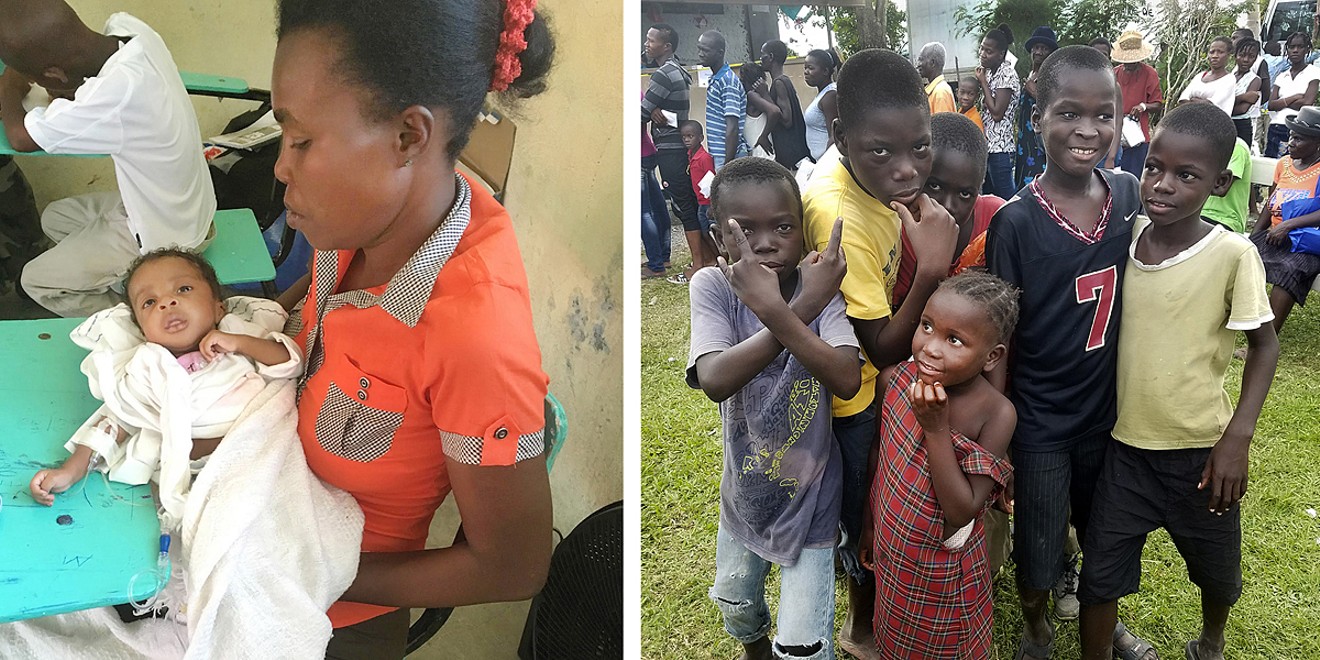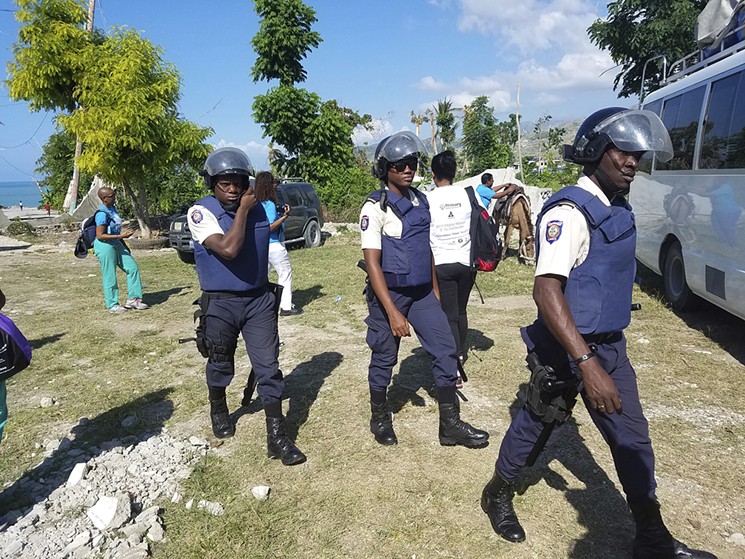Near a crumbling plaster wall inside a windowless classroom in a coastal town near Haiti's southern tip, a bearded nurse with an arm-sleeve tattoo is frantic. He's trying to save the life of Nanette, an adorable, curly-haired 2-month-old. She suffers from malnutrition and dehydration.
The nurse pricks the baby's tiny arm. Nanette is silent. She doesn't have the strength to cry. Her mom, wearing a large black hat, an orange shirt with white-and-black trim, and black pants, says she walked nearly two hours to reach this makeshift infirmary. For the past two days, she's been able to feed her daughter only crackers mixed with water.
She crossed a desolate landscape decimated seven years ago by an earthquake and just a few months ago by Hurricane Matthew. She left her three other children — ages 3, 6, and 9 — at home. "My husband died during the hurricane," she says. "He got hit in the head with a wooden plank. We don't have any food. I can't breastfeed because I'm not eating."
Here in Roche-à-Bateaux, a Miami-based mission last month tended to hundreds like Nanette. It was the first to reach the town's residents since Hurricane Matthew killed more than 1,000 people in this island nation October 6. The medics and volunteers have dealt with all kinds of ailments. There was an elderly man with a gaping softball-sized wound on the back of his foot, and the woman who had to be carried in by four men after she nearly fainted from blood pressure problems, and the woman who was sprawled on the dirty floor of a hallway outside one triage unit.
"The hurricane ripped the roof off, and the rain destroyed everything inside... I also lost my dog."
tweet this
If 2016 was bad for the United States, it was far worse for this half of the island of Hispaniola. Haiti had never really recovered from the 2010 earthquake when Matthew swept through, claiming more than a thousand lives and leaving approximately 175,000 Haitians homeless and another 800,000 in immediate need of food assistance, according to the United Nations. An electoral crisis left the country essentially without a president until last week, when Jovenel Moïse, a banana farmer and associate of former President Michel Martelly, took office. A third of Haitians are out of work, and roughly 9,600 suspected cholera cases have turned up since the hurricane.
A global $120 million relief effort is lagging, according to John Ging, operations director of the UN Office of Humanitarian Affairs. "We have gotten to 40 percent of the goal," Ging says. "That is not consistent with what we get in natural disasters. We usually get 60 percent at this juncture... That means a lot of unnecessary suffering."
Meanwhile, corruption is preventing relief from reaching storm victims. A recent investigative report by France24 Television showed that food, medicine, and supplies to rebuild homes often ends up for sale at markets throughout the country's southern side. The escalating food and supply shortage has already sparked at least one clash between the populace and police. The Haiti Sentinel reported that on December 1, three people were killed in Les Cayes during a clash with cops. One of them was a 10-year-old boy who was shot when officers opened fire on a restless crowd waiting for a boat filled with humanitarian aid to be unloaded.
The December mission to Roche-à-Bateaux and the nearby town of Torbeck was led by Jeff Lozama, founder of Man Dodo Humanitarian Foundation, which has conducted a medical mission every December since 2005 to cities in Haiti's southern peninsula. The Miami-based Man Dodo is a nonprofit that collects and delivers medical supplies, food, hygiene products, and clothes yearly to areas where access to basic health care is almost nil. The organization works in conjunction with the Haitian American Nurses Association of Florida, which recruits the volunteer medical staff. Man Dodo also sponsors an annual toy drive for 2,000 children living in Cavaillon, Lozama's birthplace.
Lozama says the damage from the storm and earthquake was obvious throughout the visit. "When we drive the coastal road, we are able to see the ocean in areas we weren't able to see it before," he says. "That's because it was all homes. They have been completely wiped out."
Indeed, Roche-à-Bateaux's coastline is in ruins. Some residents live in camping tents next to concrete rubble that used to be houses. Others live in brick shacks that are missing a wall or a roof. Some residents are lucky to have blue tarps to cover the holes.
Lozama, a 53-year-old window installation company owner who emigrated from Haiti to the States as a teen, says the devastation compelled him to take his annual caravan of aid to Roche-à-Bateaux. "We came with a large group of people, delivering a large amount of help at one time," he says. "It fuels me to do more for Haiti and bring more volunteers with me."
Volunteers handed out basic necessities such as cough medicine, Pedialyte, aspirin, baby formula, antibiotics, diapers, tampons, and canned food to approximately 600 residents of Roche-à-Bateaux. Joseph, an old man with a gory wound on his foot, said he lives in the concrete shell of what was his house just a few minutes from the infirmary. "The hurricane ripped the roof off, and the rain destroyed everything inside," he says. "I also lost four of my goats and my dog."
Joseph sustained his injury while clearing trees after the storm, when he fell on a piece of jagged metal. Michael, a medical student with a ginger beard and boyish looks, cleaned Joseph's wound with saline and antibacterial ointment and then wrapped his foot in a bandage. He also gave Joseph antibiotics to treat infection.
Nearby, Patrick "Mecca" Marcelin, a Miami-based Haitian-American rapper, checks on Nanette, the starving infant. Suddenly, she begins wailing, a sign she is finally alert. "Her reflexes started to kick in," Marcelin says. "Her eyes came back to life. It was a really touching situation."
When the baby is discharged, Marcelin provides the mother with food for herself and her children, as well as formula, Pedialyte, and other baby-care products. Another volunteer gave the woman $20 to take a taxi home.
The following day, the Man Dodo caravan travels to a beachside farm in Torbeck where 700 Haitians have gathered before dawn to receive medical treatment. When two buses carrying the 64 volunteers arrive, they are accompanied by four heavily armed Haitian police officers. Security around Haiti's southern claw is "fluid and uncertain," according to a U.S. State Department advisory issued in November. Desperate robbers have targeted convoys and other vehicles carrying supplies. Distribution points have also turned chaotic as mobs of people seeking relief have overwhelmed private security guards.
But in Torbeck, Man Dodo's relief effort goes smoothly except for the theft of a large cardboard box filled with canned goods, which was removed through a hole in the farm's fence. Among the Haitians who receive medical attention are an 8-year-old girl suffering from a staph infection. She has scratched the skin off the back of her neck and the top of her left shoulder. She winces in pain when she turns her head to show her open sores to a volunteer nurse, Emma Park. The girl's mother tells Park she has been scratching herself for more than a month. The mom and daughter live in a shack with a leaky roof and sweltering conditions.
Park cleans the wound and sends the girl on her way. A few minutes later, she and two other nurses rush to help a young Haitian woman who has passed out near one of the makeshift triage rooms. The woman's boyfriend tells a translator that she had a miscarriage two days earlier. "I came home and found her on the floor bleeding," he explains. He was unable to take her to an emergency room because the nearest hospital is more than three hours away. The medical crew moves quickly to give the woman IV fluids.
Another young Haitian woman, holding a 4-month-old girl, approaches Park and asks if the nurse would like to adopt her daughter. "She's only 26 and already has four kids," Park says. "She doesn't have a job or any family members who can help her take care of her children."
The next day, the medical mission concludes. At a farewell dinner, Marcelin, the Haitian-American rapper, laments that he can't do more to help his people.
"It's crazy that we were there to save a baby in a real near-death situation," he says. "Just imagine if we didn't show up at the time we did. What's even sadder is that there are babies we won't be able to help because we won't be here past today."














